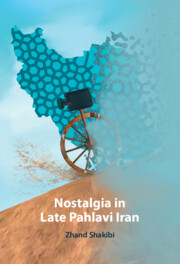
- Publisher:
- Cambridge University Press
- Online publication date:
- March 2025
- Print publication year:
- 2025
- Online ISBN:
- 9781009574280
We use cookies to distinguish you from other users and to provide you with a better experience on our websites. Close this message to accept cookies or find out how to manage your cookie settings.

Using the prism of nostalgia, this innovative work provides a new dimension to the study of late Pahlavi Iran. Set apart from dominant scholarly discussions of the period concerned solely with the causes of the 1979 Iranian Revolution, Nostalgia in Late Pahlavi Iran offers the first study of the expressions and narratives of nostalgia from the state and wider society between 1960 and 1978. Zhand Shakibi offers both fresh understandings of the confrontation of Iranian society with rapid socio-economic, cultural, and moral changes, and the first examination of the state narratives of nostalgia that responded to these shifts. Shakibi draws comparisons with forms of nostalgia in the West, exploring how late Pahlavi Iran reflects global historical patterns during moments of social change. Through close examination of sources ranging across mass media, literature, court proceedings and state policy, Nostalgia in Late Pahlavi Iran provides a new social and political history of this period.
‘Nostalgia, as Shakibi reminds us, expresses not just a yearning for the past but a yearning for change. Drawing on popular newspapers, periodicals, and official documents of the last two decades of Pahlavi Iran, this engaging book informs our understanding of what happened next: the revolution and the Islamic Republic'
Sumantra Bose - London School of Economics
‘A fascinating and highly original study of the cultural, intellectual and political climate in the last years of Pahlavi Iran. The author combines deep knowledge of Iranian history and culture with a sophisticated use of concepts and comparisons drawn from across the globe.'
Dominic Lieven - University of Cambridge
To save content items to your account, please confirm that you agree to abide by our usage policies. If this is the first time you use this feature, you will be asked to authorise Cambridge Core to connect with your account. Find out more about saving content to .
To save content items to your Kindle, first ensure no-reply@cambridge.org is added to your Approved Personal Document E-mail List under your Personal Document Settings on the Manage Your Content and Devices page of your Amazon account. Then enter the ‘name’ part of your Kindle email address below. Find out more about saving to your Kindle.
Note you can select to save to either the @free.kindle.com or @kindle.com variations. ‘@free.kindle.com’ emails are free but can only be saved to your device when it is connected to wi-fi. ‘@kindle.com’ emails can be delivered even when you are not connected to wi-fi, but note that service fees apply.
Find out more about the Kindle Personal Document Service.
Full text views reflects the number of PDF downloads, PDFs sent to Google Drive, Dropbox and Kindle and HTML full text views for chapters in this book.
 Loading metrics...
Loading metrics...
Book summary views reflect the number of visits to the book and chapter landing pages.
 Loading metrics...
Loading metrics...
* Views captured on Cambridge Core between #date#. This data will be updated every 24 hours.
Usage data cannot currently be displayed.
Accessibility compliance for the PDF of this book is currently unknown and may be updated in the future.